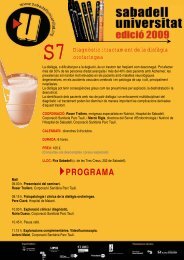From Party to Movement? The German Radical Right
From Party to Movement? The German Radical Right
From Party to Movement? The German Radical Right
Create successful ePaper yourself
Turn your PDF publications into a flip-book with our unique Google optimized e-Paper software.
Minkenberg “<strong>From</strong> <strong>Party</strong> <strong>to</strong> <strong>Movement</strong>?<strong>The</strong> <strong>German</strong> <strong>Radical</strong> <strong>Right</strong> in Transition” 4<br />
in<strong>to</strong> account. In comparative analyses, the emphasis is usually on right-wing radical parties. <strong>The</strong><br />
differences in party strength are then measured in terms of membership and elec<strong>to</strong>ral support, and<br />
they are explained in the party and elec<strong>to</strong>ral research literature by pointing both at ideological<br />
variations and the degree of fragmentation of the right-wing radical party sec<strong>to</strong>r and the political and<br />
elec<strong>to</strong>ral system, on the one hand, other parties’ strategies, i.e. the “political space” for the radical<br />
right, on the other (for example in Betz or Kitschelt). <strong>The</strong>se are primarily institutional or political-<br />
structural explanations which do without reference <strong>to</strong> cultural variables such as political and other<br />
traditions. Moreover, they ignore the non-party sec<strong>to</strong>r of right-wing radical mobilization. Already in<br />
1988, Klaus von Beyme argued that “future studies of right-wing extremism will have <strong>to</strong> pay more<br />
attention <strong>to</strong> the whole political context of this political movement instead of being preoccupied with<br />
traditional party and elec<strong>to</strong>ral studies.” 7<br />
Following this pledge, the organizational variants of the radical right will be distinguished by<br />
their approach <strong>to</strong> institutional political power and public resonance. <strong>The</strong> most obvious and most<br />
frequently studied are parties and elec<strong>to</strong>ral campaign organizations which participate in elections and<br />
try <strong>to</strong> win public office. Next <strong>to</strong> these are social movement organizations try <strong>to</strong> mobilize public<br />
support as well but do not run for office, rather they identify with a larger social movement (a<br />
network of networks with a distinct collective identity) and offer interpretative frames for particular<br />
problems. 8 Finally, smaller groups and sociocultural milieus operate relatively independently from<br />
either parties and larger social movements and do not exhibit formal organizational structures but<br />
can also be characterized as networks with links <strong>to</strong> other organizations and a collective identity<br />
which tends <strong>to</strong> be more extreme than that of the parties or movement organizations (including higher<br />
levels of violence). <strong>The</strong>y represent a “micro-mobilization potential” for the radical right. 9<br />
Based on these criteria of distinction, the current <strong>to</strong>pography of the radical right in<br />
<strong>German</strong>y can be summarized as in table 1.<br />
Table 1: Dominant Ac<strong>to</strong>rs in the <strong>German</strong> <strong>Right</strong>-wing Family (1990s)<br />
Government and Opposition 35, 2 (Spring 2000), pp. 170-188.<br />
7 Klaus von Beyme, “<strong>Right</strong>-wing extremism in post-war Europe,” in: West European Politics 11, 2 (1988), p. 16.<br />
8 See Sidney Tarrow, Power in <strong>Movement</strong> (Cambridge: Cambridge University Press, 1994).<br />
9 Werner Bergmann, “Ein Versuch, die extreme Rechte als soziale Bewegung zu beschreiben”, in: Werner<br />
Bergmann and Rainer Erb (eds.), Neonazis und rechte Subkultur (Berlin: Metropol Verlag, 1994), pp. 183-207.<br />
S4. EXTREMA DRETA A EUROPA, UNA REALITAT POLIÈDRICA<br />
Sabadell, 5 i 6 de juliol de 2004













